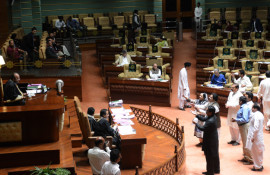
“It is really hard for people like me to climb all those stairs,” an elderly Mehram Maitlo told The Express Tribune. Maitlo, in his mid 60s, was at the court to attend a hearing. Like most other heritage buildings, the main court is also in bad shape but is still intact except for a small part of it, which probably served as a canteen. However, its elevated location means that rainwater and sewerage drainage is never a problem.
There used to be two civil judges running the court but for the past three months one of these posts has been vacant. As a result, cases from areas including Dubbar, Sangrar, Railway and Kandhra are pending. Meanwhile, the sole judge deals with petitioners from Saleh Pat, Rohri, Excise and Jhangro.
A poor correspondence system means that people have to come to court to find out if the judge appointed to deal with their matters is there or not. People such as Maitlo, who lives in Kandhra, has come to court with the hope that a judge might have been posted by now. It is not the first trip he has made.
“I’ve come here so many times only to hear from the staff that there is no judge yet,” he sighed. According to him, the long climb up is made worse by the fact that there is no arrangement for drinking water at the courts. “People have to go down to the roadside hotels just to drink water,” he said.
Azad Bhutto, another petitioner from Kandhra, arrived at the court in a state similar to Maitlo’s. Though just in his 40s, Bhutto was huffing and puffing and gripping onto a water bottle that he immediately downed once he reached the court. “This [way to the court] really tests people’s stamina!” he exclaimed.
According to one of the staff members, Mohammad Ali Jinnah once practised law in this court. But those days of glory seem to be long gone.
Another employee of the court requesting anonymity said the court has no facilities. Even the staff has to bring water from home or go to the hotels by the road. There are only two toilets, one for the two judges and the other for the rest of the employees and public. “Sometimes there is no water even in the toilets,” the employee complained. “I have to go up and down the stairs many times a day and it is simply exhausting,” he said.
“Our salaries are very low as compared to the wages of high court employees or lower court staff in other provinces,” said a staff member. “High court employees get many fringe benefits but we don’t get anything except a low salary,” he added bitterly. He said that since October 18, court timings have been changed and now they have to work from 8:00 am to 5:30 pm. Court proceedings come to an end by 2:00 pm or 2:30 pm but the employees cannot leave early even if they are free.
Although a more conveniently accessible plot has been allocated for the construction of a new civil court, there are not enough funds to actually build it, informed a lawyer, Ellahi Bux Maitlo. “Climbing to the top is an uphill task, especially for elderly people,” he admitted.
Another lawyer, Imam Bux Mahar, agreed but said that although it was difficult to reach the building, it is a good location from a security point of view.
Published in The Express Tribune, November 8th, 2010.

1731583017-0/diddy-(42)1731583017-0-165x106.webp)


1719315628-0/BeFunky-collage-(8)1719315628-0-165x106.webp)












COMMENTS
Comments are moderated and generally will be posted if they are on-topic and not abusive.
For more information, please see our Comments FAQ